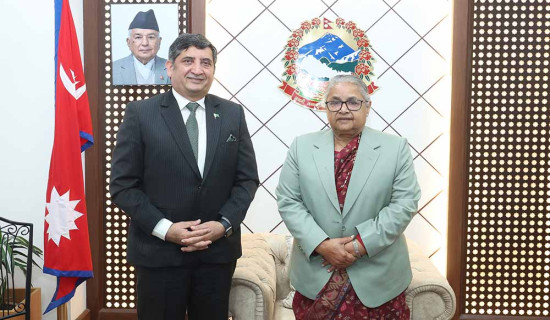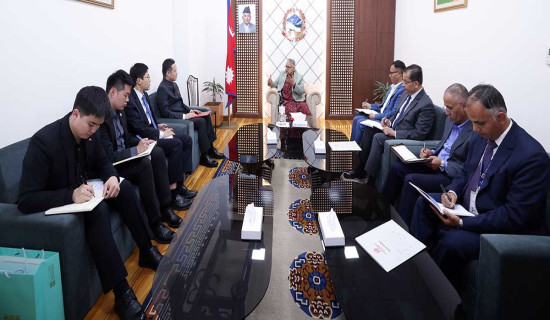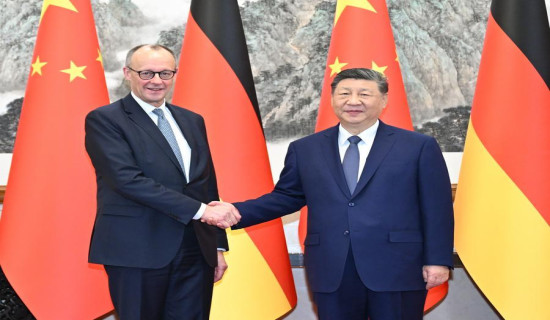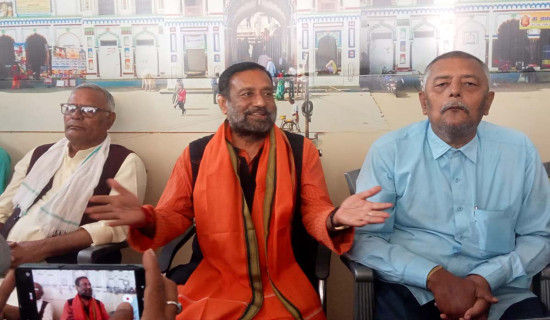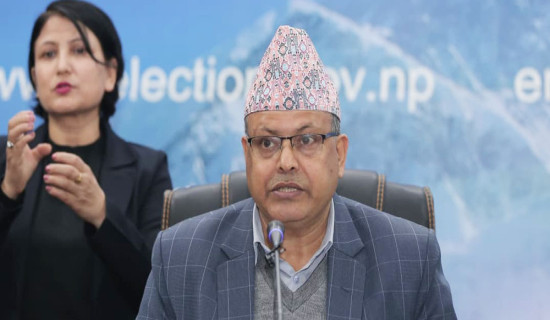- Saturday, 28 February 2026
The Rules Of Democratic Game
The political trends of Nepal represent a widespread perplexity. No rational mind is capable of exactly narrating its freewheeling play unimpeded by any dazzling light of reason or moral norm required to achieve highest public good. The penchant for fissiparous tendency in the nation’s political parties has enveloped them into split off complexes difficult to define in terms of political spectrum. They are less attuned to the habit of getting along like a system of socialised entities. The sad truth is that leaders’ whirlwind of promising, sermonising, communicating, lettering and mobilising social forces in the nation for the forthcoming national and provincial elections has stitched the nation to face varied messages, even some hyperbolic in nature.
Nepal has poor means to finance bloated expectations of people and set a stable democratic future. Since politics is not a game of sublime idiom of adoring the heterodox opponents, ordinary Nepalis are awakened more by their unfulfilled legitimate needs, aspirations and rights seeking redemption than unbounded dry party directions and the art of polemics. They are raged by the betrayal of their trust of delivering immense democratic possibilities while the indoctrinated ignorant uprooted from their consciousness are just apathetic voters, some even habituated to cast invalid votes. Only civic education can hone their maturity to overcome their vegetative unconsciousness and the burning desire to engage as active citizens.
Instrumental politics
The attentive Nepalis are frustrated over the malfunctioning of democratic institutions. The aspiring young generations across the party spectrums are looking for a leadership shift which can ensure their improved prospects in the future. In democratic politics, rules of the game are important parts of political life. It flashes each generation of Nepalis’ spirits with the fire of a new imagination of democracy, human rights, justice and peace with the perfectionist figment of thoughts, not dullness of endlessly repeated leaders who lack virtues and skills, do not know their limitations and help them less in escaping a myriad of problems of governance. The political realism of Nepali leaders rooted in natural selfishness has deeply disenchanted them from instrumental politics of both the left radicalism and the right neo-liberalism unchecked by the tightrope of moral conscience and democratic ethics of welfare state.
Both became the defenders of political establishment and their experience of Nepali politics has overwhelmed them to relinquish their old ideological dogmas when the parties had been set up and defined their destinies. The democratic middle path, the unambiguously worthy space, remains in ideological void without whose centrality Nepal can hardly achieve the spirit of constitutionalism, resolve multi-layered grievances and acquire reasonable political stability. The radical and the right have left the middle space empty to be filled by others where ordinary Nepalis are only conjecturing which is the right institution to put faith in.
Democratic rules of game defined by constitutional and electoral laws have provided norms of who should participate in the political processes and who are proscribed from it. But the primacy of power over the laws still provides authority to leadership and their strivings have compelling reasons to win election to justify this deed. It has generated irreconcilable divides and consumed national energy for sustainable progress. In democracy, leadership performance is judged by norms, principles and procedures. It is about the production and allocation of public goods to the people so that no one is left behind to challenge its legitimacy and celebrate its contender thus straining the regulation of society.
Politics, after all, is about public policy to strengthen the state and enable it to fulfil people’s constitutional rights. Nepal has broadened the rules of the game by including more and more of constitutional and human rights, principles of social inclusion, proportional representation, popular sovereignty, affirmative action, protection of minorities and social justice. But the requisite resources and institutional muscle of the nation to fulfil them are vitally amiss. They are driving politics to a combustible path, not stability-driven. Civil society and NGOs are active in educating about the rights of people, not duties and have been unsuccessful to separate the indoctrination and coercion from political relationships and preferences.
The nation’s political culture, therefore, remains the same - feudal, patriarchal and parochial which constrains the realisation of egalitarian principles of the constitution in public life, public policy and legal practices. Feudal culture nourishes a decentralised version of polity. But the current centralisation of politics visibly lacks an order to follow the rules of the game. As a result, the struggle of the bottom of society for self-rule against the top political class remains unsettled. The diversity of desires and envy of leaders’ self-interest dominate the political culture and, therefore, ordinary Nepalis have leering doubts as to whether the written rights in the constitution can override an unwritten transcript of society which made national politics largely informal beyond the values and institutional preference of people for good life.
This is the elemental hope of Nepali society from politics. No one has so far clearly spelled out the incentives for patriarchal Nepali leaders to head off from their culture and style of smugness so that they can embrace the feelings and expectation of people from electoral politics. When the politics of the nation becomes a live refutation of democratic and constitutional principles it does not secure political stability. It loses the capacity of polity to realise the Directive Principles and Policies of the State and expand the opportunity structure. It thus drags the nation’s vibrant stream of political life into inertial backwater. This is compelling Nepalis to look for opportunity in alternative leadership who can think and act beyond flashy linguistic games to fill the dignity of life.
The compulsion and impossible responsibility leave the established parties on the edge of deinstitutionalisation though two dominant parties - Nepali Congress and CPN-UML - still dominate the pivot where all others muddle around for alliance and counter-alliances hatching a forking path, not national unity for nation building. One irony of Nepali constitution is that it has broken up citizens into different categories of organised social groups, each competing with others for more privileges and access to the institutional resources of state. Those clubbed into “all others” outside the categories face a lack of political agencies to resolve the identity crisis. Their tendency to habitually switch loyalties from one political party to another in search of opportunity has rendered partisan attachment shabby.
When cadres and followers are united by ideology, the costs of politics become tiny. Ideology fosters volunteerism, solidarity and affinity for large scale collective action. It clogs the room for special interest groups, bichaulias, and their capacity to invert the party discipline and penetrate into the core of its decision making by doling out money in candidates’ selection, campaign financing, media manipulation or mobilising supporters. These bichaulias are powerful but their colour is pre-political as they are looking for personal or group privileges, not public or national interests and make inroads into the fragmented nature of the party- parliamentary-judiciary complex.
As they do not harbour a popular base they stitch up to top party leaders, distort fair competition of leadership within the parties and outside and blind them to the task of appraising the soldering maelstrom of feelings of people until their drive either fly into a rage or infect pathological disorder. Nepalis are expecting liberation from the hierarchy of bichaulias, or free-riders who are destroying all the values of democracy and moral and material basis of Nepalis’ co-existence, social contract and the spirit of constitutionalism. The grey conformity to ideological distortion by party intellectuals, partisan media and cadres mark an erosion of inner-party democracy and ideological coalition among the like-minded parties.
In this sense, they squeeze the ability of leaders to use scruples and make a distinction between the private and the public interests. Nepal’s gleaming future is less likely to emerge when the success of democratic struggle lands with more and more rights and less and less duties of citizens thus emasculating the power of leadership to fulfil them. The power of Nepali state to balance the two for the establishment of reasonable political order is essential so that the government can govern with authority, legitimacy and effectiveness.
Political morality
Sigmund Freud is right when he says, “The benefits of order are undeniable; it enables people to make the best use of space and time, while sparing their mental forces” to plan for higher order and achievement and fulfil the purpose of rule-based life. Otherwise, Nepal will continue to face the crisis of political morality. Obviously, political morality is a set of normative values to guide and govern individuals’ life, choices and actions, values that enables one to respect the line of Laxman Rekha, judge what is right and what is wrong so that they can adjust to the right way of life and never overstep the bounds of constitutional code. Those mutilated by personal selfishness suffer the shortfall of morality and fail to exercise conscience and conviction in personal and public life.
When Nepali leaders execute one-sided indoctrination of cadres and followers they disarm them, move them back and forth blindly to conformity and blunt their critical sense of who is the right candidate to choose for leadership in the forthcoming elections. In a fledgling democracy, it is a fatal enemy of reason, rationality and enlightenment and, in the process, breeds anti-change mentality. Nepal’s ability to adopt meritocracy is limited as its legitimacy is derived from democratic principles, procedures, institutions and international affiliation. It has, therefore, to grow and improve the quality of life under democratic rules of the game and the robustness of national integrity system and performance.
(Former Reader at the Department of Political Science, TU, Dahal writes on political and social issues.)









-original-thumb.jpg)

